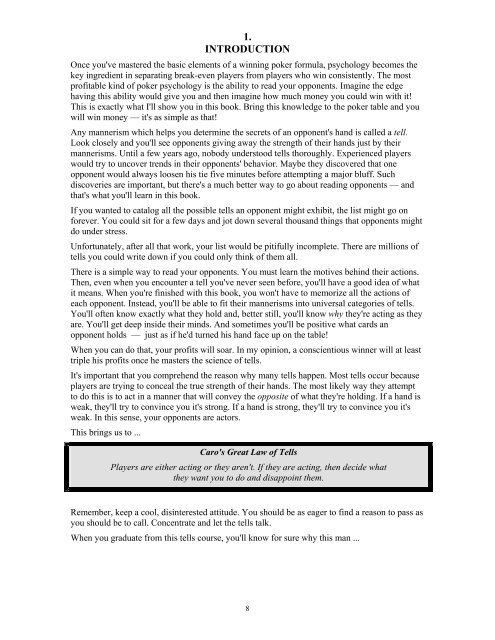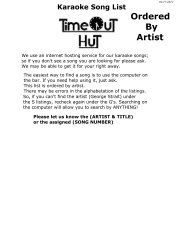+Mike Caro - Caros Book Of Poker Tells.pdf - Time Out Hut
+Mike Caro - Caros Book Of Poker Tells.pdf - Time Out Hut
+Mike Caro - Caros Book Of Poker Tells.pdf - Time Out Hut
You also want an ePaper? Increase the reach of your titles
YUMPU automatically turns print PDFs into web optimized ePapers that Google loves.
1.<br />
INTRODUCTION<br />
Once you've mastered the basic elements of a winning poker formula, psychology becomes the<br />
key ingredient in separating break-even players from players who win consistently. The most<br />
profitable kind of poker psychology is the ability to read your opponents. Imagine the edge<br />
having this ability would give you and then imagine how much money you could win with it!<br />
This is exactly what I'll show you in this book. Bring this knowledge to the poker table and you<br />
will win money — it's as simple as that!<br />
Any mannerism which helps you determine the secrets of an opponent's hand is called a tell.<br />
Look closely and you'll see opponents giving away the strength of their hands just by their<br />
mannerisms. Until a few years ago, nobody understood tells thoroughly. Experienced players<br />
would try to uncover trends in their opponents' behavior. Maybe they discovered that one<br />
opponent would always loosen his tie five minutes before attempting a major bluff. Such<br />
discoveries are important, but there's a much better way to go about reading opponents — and<br />
that's what you'll learn in this book.<br />
If you wanted to catalog all the possible tells an opponent might exhibit, the list might go on<br />
forever. You could sit for a few days and jot down several thousand things that opponents might<br />
do under stress.<br />
Unfortunately, after all that work, your list would be pitifully incomplete. There are millions of<br />
tells you could write down if you could only think of them all.<br />
There is a simple way to read your opponents. You must learn the motives behind their actions.<br />
Then, even when you encounter a tell you've never seen before, you'll have a good idea of what<br />
it means. When you're finished with this book, you won't have to memorize all the actions of<br />
each opponent. Instead, you'll be able to fit their mannerisms into universal categories of tells.<br />
You'll often know exactly what they hold and, better still, you'll know why they're acting as they<br />
are. You'll get deep inside their minds. And sometimes you'll be positive what cards an<br />
opponent holds — just as if he'd turned his hand face up on the table!<br />
When you can do that, your profits will soar. In my opinion, a conscientious winner will at least<br />
triple his profits once he masters the science of tells.<br />
It's important that you comprehend the reason why many tells happen. Most tells occur because<br />
players are trying to conceal the true strength of their hands. The most likely way they attempt<br />
to do this is to act in a manner that will convey the opposite of what they're holding. If a hand is<br />
weak, they'll try to convince you it's strong. If a hand is strong, they'll try to convince you it's<br />
weak. In this sense, your opponents are actors.<br />
This brings us to ...<br />
<strong>Caro</strong>'s Great Law of <strong>Tells</strong><br />
Players are either acting or they aren't. If they are acting, then decide what<br />
they want you to do and disappoint them.<br />
Remember, keep a cool, disinterested attitude. You should be as eager to find a reason to pass as<br />
you should be to call. Concentrate and let the tells talk.<br />
When you graduate from this tells course, you'll know for sure why this man ...<br />
8



